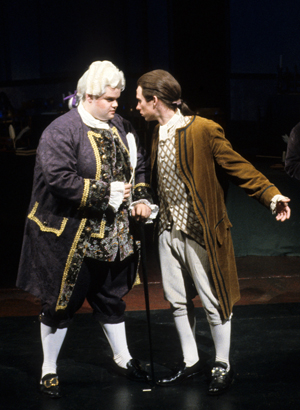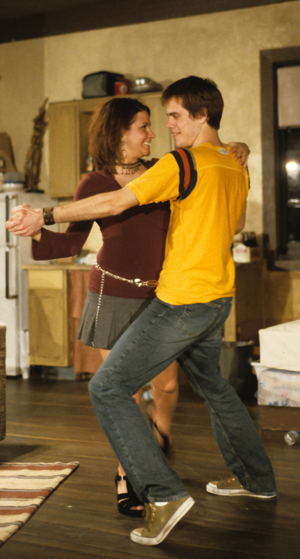1776October 7–9, 2004A play by Peter Stone
Music and lyrics by Sherman Edwards
Production Staff
Director: James Fisher
Assistant Director: Brett Gann '07
Musical Director: Teresa O'Connell
Scene Designer: James Gross
Costumer: Laura Conners
Choreographer: Dana W. Fisher
Stage Manager: Donald Claxon '06
Asst. Stage Manager: Kyle Trusgnich '08
Cast List
John Hancock: Andrew Dits '07
Dr. Josiah Bartlett: Greg Strodtman '07
John Adams: Jason Roberts '05
Stephen Hopkins: Terry J. Archambeault '05
Roger Sherman: Tom Elliott '08
Lewis Morris: Nick Kraynak '08
Robert Livingston: Tyler Bernet '05
Rev. Jonathan Witherspoon: Kyle Cassidy '08
Benjamin Franklin: Wayne Lewis '06
John Dickinson: Denis Farr '06
James Wilson: Jim Stephens '08
Caesar Rodney: Tyler Williams '08
Col. Thomas McKean: Pete Wagner '06
George Read: Ben Cunningham '07
Samuel Chase: Clifford Lee '06
Richard Henry Lee: Christopher Mehl '05
Thomas Jefferson: Sterling Carter '07
Joseph Hewes: Matt McKay '06
Dr. Lyman Hall: Nelson Barre '08
Charles Thomson: Ryan Champion
Andrew McNair: Richard Winters '06
Abigail Adams: Abby Gillan
Martha Jefferson: Carrie Macy
A Painter/A Leather Apron: Filip Drambarean '08
A Courier: Blake Anderson R. Meadows
Production Assistance
Lightboard Operator: Luke Elliott '05
Soundboard Operator: Masud Bahramand '05
Spotlight Operators: Tony Lewis '07, Braden Pemberton '07
1776 was Wabash's first full scale musical theater production in over 20 years. It is a legendary and unique Broadway musical, was first performed in 1969 (becoming a lavish screen musical in 1972) and received the Tony Award as Best Musical. 1776 is set in the Continental Congress in May, June, and July 1776 as the founding fathers struggle against congressional apathy, military disaster, personal pressures, and Philadelphia's blazing heat wave to establish the USA. Musical sequences and dialogue are drawn directly from contemporary accounts, minutes of the Congressional sessions, and the correspondence of John Adams and his wife, Abigail. A charming score, bold dramatic scenes, and memorable characters make 1776 one of the classics of the musical stage.
This page is part of an ongoing project to document the history of the theatre productions performed at Wabash College. If you have information not included on this page, please contact the Theater Department or Professor Dwight Watson (watsond@wabash.edu).
|

Photo Album
|
The Vaudevilles of ChekovFebruary 23–26, 2005Short plays by Anton Chekhov
Production Staff
Director: Dwight Watson
Assistant Director: Brett Gann '07
Scenic Designer: James Gross
Lighting Designer: Donald Claxon '06
Costume Designer: Laura Conners
Sound Designer: Braden Pemberton '07
Stage Manager: Tom Elliott '08
Asst. Stage Manager: Anthony Lewis '07
Cast List
The Alien Corn
Kamyshev: Nick Kraynak '08
Champugne: Wes Jacks '06
Misha: Danny Lippert '06
The Bear
Popva: Carrie Macy
Smirnov: Matt McKay '06
Luka: Jason Roberts '05
Gardener: Amy Young
Coachman: Mark Mattern '06
On the Harmful Effects of Tobacco
Ivan Ivanovich Nyukhin: Morgan Patchell '05
A Jubilee
Shipoochin: Chris Mehl '05
Tatiana: Carrie Macy
Hirin: Luke Elliott '05
Merchootkina: Jamie Ritchie-Watson
Shareholders: Wes Jacks '06, Jason Roberts '05, Danny Lippert '06
The Proposal
Chubukov: Mark Mattern '06
Natalya Stepanovna: Amy Young
Lomov: Denis Farr '06
Production Assistance
Light Board Operator: Richard Winters '06
Sound Board Operator: Sterling Carter '07
Anton Chekhov (1860-1904) is known principally for his full-length plays — The Cherry Orchard, Uncle Vanya, and The Seagull — but early in his career he wrote several farcical one-acts he dubbed "vaudevilles." Each of these short plays deals with a subject that Chekhov would continue to explore in his later, more famous work: love, in all its manifestations. The Proposal deals with a heated property dispute that derails a marriage proposal with outrageously funny consequences. In The Bear, an enraged creditor falls spontaneously in love with his debtor's widow as she vehemently refuses to pay her deceased husband's debt. These two short witty plays, rife with characteristically Chekhovian insight, will share a bill with Chekhov's The Alien Corn, On the Harmful Effects of Tobacco, and A Jubilee, plays of explosive relationships and comic anarchy.
This page is part of an ongoing project to document the history of the theatre productions performed at Wabash College. If you have information not included on this page, please contact the Theater Department or Professor Dwight Watson (watsond@wabash.edu).
|
Scenic Designer's Notes Photo Album |
This is Our YouthApril 20–23, 2005A play by Kenneth Lonergan
Production Staff
Director: Michael Abbott '85
Scenic and Lighting Designer: James Gross
Costume Designer: Laura Conners
Stage Manager: Donald Claxon '06
Asst. Stage Manager: Reynaldo Pacheco '06
Cast List
Dennis: Andrew Dits '07
Warren: Wesley Jacks '06
Jessica: Naseema Mohammed
Production Assistance
Lightboard Operator: Thomas Elliott '08
Soundboard Operator: Tyler Bernet '05
Set on Manhattan's Upper West Side, This Is Our Youth follows 48 hours in the lives of three very lost young souls. Kenneth Lonergan’s award-winning play is a lacerating, meticulous, and hilarious snapshot of the simmering moment between adolescence and adulthood. The play takes place in Dennis Ziegler's apartment in March 1982. Dennis's friend Warren Straub, a dejected 19-year-old, has just been kicked out of his house and stolen $15,000 from his abusive lingerie-tycoon father. Dennis spends some of the money on cocaine, hoping to sell it to a friend of his for much more. Jessica Goldman, an "anxiously insightful" fashion student, comes over and Warren hopes that he can use the money to entice her into bed. The play explores timeless issues of adolescence and maturity, as well as the Reagan Era in which it takes place: the characters feel adrift in a country that now rejects the 1960s-style liberalism that they were brought up to believe in. The New York Times says, "In a season in which some of the wise men of the theater have been trying to force-feed insipid fare…to young audiences, it’s sheer relief to celebrate the return of a rambunctious and witty play about wayward teenagers and post-adolescents that doesn't turn youthful travails into plastic rap—This Is Our Youth—by turns caustic, cruel, and compassionate—is the real real world." ? This page is part of an ongoing project to document the history of the theatre productions performed at Wabash College. If you have information not included on this page, please contact the Theater Department or Professor Dwight Watson (watsond@wabash.edu). |

Scenic Designer's Notes
|
